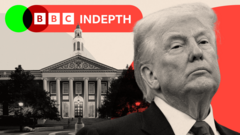As the trial commences, questions arise about monopolistic practices and the future of social media platforms.
**Meta Faces Landmark Antitrust Trial with Potential Impact on Instagram and WhatsApp**

**Meta Faces Landmark Antitrust Trial with Potential Impact on Instagram and WhatsApp**
Antitrust proceedings against Meta could reshape social media ownership and competition dynamics.
In a pivotal move in the landscape of digital industries, the Federal Trade Commission (FTC) has initiated a groundbreaking antitrust trial against Meta Platforms Inc., the parent company of Facebook, Instagram, and WhatsApp. Taking place in Washington D.C. this Monday, the case focuses on the government's assertion that Meta's acquisitions of Instagram in 2012 and WhatsApp in 2014 were strategic moves to eliminate competition and establish a monopoly in the social media space.
The FTC has scrutinized these acquisitions for years, with prior approval from the commission still under question. Should the FTC prevail, Meta CEO Mark Zuckerberg could be compelled to divest Instagram and WhatsApp. Experts predict Meta will defend itself by arguing that its ownership has enhanced user experiences on Instagram, contradicting the FTC’s claims. “The FTC's case emphasizes that buying Instagram was meant to neutralize a rising competitive threat,” explains Rebecca Haw Allensworth, an antitrust law professor at Vanderbilt University.
Throughout the trial, Zuckerberg and former COO Sheryl Sandberg are expected to testify, potentially revealing internal communications that may bolster the FTC's position. Sentences from Zuckerberg’s past, such as "it's better to buy than to compete," could serve as key evidence, according to legal analysts.
The political backdrop of this case is complex, as it began during former President Donald Trump's first term. Trump had previously lobbied against the FTC’s actions concerning Meta. Relations between Trump and Zuckerberg had soured significantly after Meta banned Trump from its platforms following the Capitol insurrection in January 2021; however, they have reportedly improved since. Amidst Trump’s administration changes, including the firing of two Democratic FTC commissioners, concerns about political influence and the independence of regulatory bodies have intensified.
The outcome of this trial may have broad implications not just for Meta, which has asserted that the FTC's current stance contradicts earlier findings, but also for the future of competition in the broader tech industry. As Meta argues that social media platforms now face greater global competition from entities like TikTok and Snapchat, legal experts note that the FTC’s case may be more challenging to substantiate than other ongoing antitrust battles, such as the one against Google.
Meanwhile, as the FTC takes on Meta, its other cases, including the significant USA v Google, continue to unfold, shaping the overarching narrative of digital marketplace oversight. Ultimately, the implications of this trial could reshape not only Meta's business model but also the regulatory landscape governing tech giants in America.
The FTC has scrutinized these acquisitions for years, with prior approval from the commission still under question. Should the FTC prevail, Meta CEO Mark Zuckerberg could be compelled to divest Instagram and WhatsApp. Experts predict Meta will defend itself by arguing that its ownership has enhanced user experiences on Instagram, contradicting the FTC’s claims. “The FTC's case emphasizes that buying Instagram was meant to neutralize a rising competitive threat,” explains Rebecca Haw Allensworth, an antitrust law professor at Vanderbilt University.
Throughout the trial, Zuckerberg and former COO Sheryl Sandberg are expected to testify, potentially revealing internal communications that may bolster the FTC's position. Sentences from Zuckerberg’s past, such as "it's better to buy than to compete," could serve as key evidence, according to legal analysts.
The political backdrop of this case is complex, as it began during former President Donald Trump's first term. Trump had previously lobbied against the FTC’s actions concerning Meta. Relations between Trump and Zuckerberg had soured significantly after Meta banned Trump from its platforms following the Capitol insurrection in January 2021; however, they have reportedly improved since. Amidst Trump’s administration changes, including the firing of two Democratic FTC commissioners, concerns about political influence and the independence of regulatory bodies have intensified.
The outcome of this trial may have broad implications not just for Meta, which has asserted that the FTC's current stance contradicts earlier findings, but also for the future of competition in the broader tech industry. As Meta argues that social media platforms now face greater global competition from entities like TikTok and Snapchat, legal experts note that the FTC’s case may be more challenging to substantiate than other ongoing antitrust battles, such as the one against Google.
Meanwhile, as the FTC takes on Meta, its other cases, including the significant USA v Google, continue to unfold, shaping the overarching narrative of digital marketplace oversight. Ultimately, the implications of this trial could reshape not only Meta's business model but also the regulatory landscape governing tech giants in America.




















